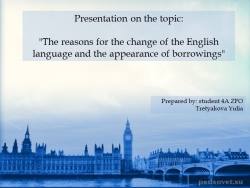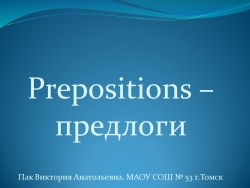Презентация Заимствование в английском языке 9 класс

- Рубрика: Презентации / Другие презентации
- Просмотров: 96
Презентация для классов "Презентация Заимствование в английском языке 9 класс" онлайн бесплатно на сайте электронных школьных презентаций uchebniki.org.ua
Presentation on the topic:
"The reasons for the change of the English language and the appearance of borrowings"
Prepared by: student 4A ZFO
Tretyakova Yulia
The role of the English language in the world
English is one of the international languages of the United Nations, is the official language in more than 40 countries.
English is a global language
It is an international language in fields such as science, business, aviation, entertainment, media and diplomacy. Half of the world's population speaks English. English is becoming a world language because it is studied in almost all educational institutions of the world. But like any language, it changed.
What were the reasons and how did the language change? Let's try to figure it out.
Borrowings in the vocabulary of the English language
Back in the early Middle Ages, English adopted a large number of borrowings from Scandinavian languages (including such basic words as skin 'skin', ill 'sick' and even she 'she'). The most massive flow of borrowings is medieval, after the Norman Conquest, from Old French; as a result, almost half of the English dictionary has Romance roots. In Modern times, a large number of learned Latinisms and new borrowings from continental languages have entered the language.
The influence of the Roman Empire on the development of the English language:
A century after the conquest of the British Isles by Caesar, in 44 BC, the Roman Emperor Claudius visited the British Isles, after which Britain became considered a Roman province. During this period, there was close communication between the Celtic people and the Romans, which, of course, was reflected in the language.
So, many words in modern English have Latin roots. For example, the word castra (from Lat. "camp"). This root is found in many geographical names of modern Britain - Lancaster, Manchester, Leicester.
There are also such common words as street "street" (from the Latin expression via strata "paved road") and wall "wall" (from vallum "shaft").
There are many common nouns borrowed from Latin: wine "wine" – from Latin. vinum "wine"; pear "pear" – from Latin. pirum "pear"; pepper "pepper" – from Latin. rireg.
Old English
The immediate progenitors of the English
people are the Germanic tribes of the Saxons, Jutes,
Angles and Frisians, who penetrated the territory of Britain in 449. Since these tribes were much more numerous than the Celtic ones, the Anglo-Saxon dialect gradually completely replaced the Celtic dialect from use.
Thanks to the Anglo-Saxon tribes, many names of geographical objects that have survived to the present day appeared in the English language. Also, words such as butter, pound, cheese, alum, silk, inch, chalk, mile, mint – have common Germanic roots borrowed from Latin. Or the word Saturday stands for "the day of Saturn" - the father of the god Jupiter in ancient Roman mythology.
Middle English Period
In the middle of the XI century, the inhabitants of northern France conquered Britain. William the Conqueror, a Norman by birth, becomes king. Since that time, the era of three languages begins in the history of the people. The language of the aristocracy, the courts became French, Latin remained the language of science, and the common people continued to speak Anglo-Saxon. It was the mixing of these three languages that gave rise to the formation of modern English.
New England Period
Linguists interpret modern English as a mixed language. This is due to the fact that many words, in the general sense, do not have common roots. Let's compare for example a number of words in Russian: head – head - chief. In English , the same series is represented by the words: head – chapter – chief. Why did this happen? Everything is explained precisely by the mixing of the three languages. Anglo-Saxon words denoted specific objects, hence the word head. From Latin, the language of science and education, the word chapter has remained. The word that was used by the nobility, chief, remained from the French.
The same distinction can be found in many semantic series in the English language. For example, there are words that denote the name of an animal (words of Germanic origin) and the name of the meat of this animal (these words originated from Old French). So, ox — bull, cow — cow, calf — calf, sheep — sheep, pig — pig; but beef — beef, veal — veal, mutton — mutton, pork — pork.
The New England period of the history of the English language
The great William Shakespeare (1564-1616) is rightfully considered the founder of the English literary language. He is credited with the origin of many idiomatic expressions that are used in modern English. In addition, Shakespeare invented many new words that have taken root in the language.
For example, the word swagger "swaggering gait; swagger" is found for the first time in the history of the English language in Shakespeare's play "A Midsummer Night's Dream".
The modern language in the British Isles is not static at all. The language lives, neologisms constantly appear, some words go into the past.
However, the most important difference between English and many European languages is that
there are no static norms in the UK. On the contrary, it is the various dialects and adverbs that are in great use. Not only do the pronunciation of words differ at the phonetic level, but there are also completely different words denoting the same concept.
The English language has also preserved its traditions of "mixing languages" in our days.
Conclusion:
The modern language is a product of a long historical development, during which the language undergoes diverse changes due to various reasons.
With the departure of the Romans from the British Isles in 410, the Latin language also left with them. Starting in 450, along with the first raids of the Germanic tribes of Angles, Saxons and Jutes, the first raids on the islands began. Starting from the 7th century, the rules of written and oral speech began to be formalized by the missionaries bringing Christianity.
With the spread of literacy, English has slowed down its change, but it continues to change now and to this day.
















